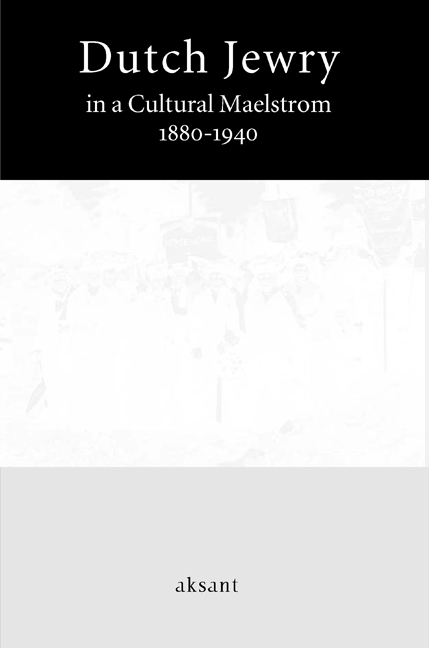Book contents
- Frontmatter
- Contents
- Foreword
- The New “Mosaik”: Jews and European Culture, 1750-1940
- The Politics of Jewish Historiography
- “The First Shall be the Last”: The Rise and Development of Modern Jewish Historiography in the Netherlands Until 1940
- Epigones and Identity: Jewish Scholarship in the Netherlands, 1850-1940
- Judaism on Display: The Origins of Amsterdam's Jewish Historical Museum
- De Vrijdagavond as a Mirror of Dutch Jewry in the Interbellum, 1924-1932
- “Holland is a Country which Provokes Serious Reflection…”: Images of Dutch Jewry in the German Jewish Press
- Spinozism and Dutch Jewry between 1880 and 1940
- Spinoza's Popularity in Perspective: A Dutch-German Comparison
- Mozes Salomon Polak: Jewish “Lerner” and Propagator of Freemasonry, Spiritualism, and Theosophy
- Jewish Women, Philanthropy, and Modernization: The Changing Roles of Jewish Women in Modern Europe, 1850-1939
- Roosje Vos, Sani Prijes, Alida de Jong, and the others: Jewish Women Workers and the Labor Movement as a Vehicle on the Road to Modernity
- Stemming the Current: Dutch Jewish Women and the First Feminist Movement
- Dutch Jewish Women: Integration and Modernity
- Index of Names of Persons
- Index of Subjects
Roosje Vos, Sani Prijes, Alida de Jong, and the others: Jewish Women Workers and the Labor Movement as a Vehicle on the Road to Modernity
Published online by Cambridge University Press: 26 January 2021
- Frontmatter
- Contents
- Foreword
- The New “Mosaik”: Jews and European Culture, 1750-1940
- The Politics of Jewish Historiography
- “The First Shall be the Last”: The Rise and Development of Modern Jewish Historiography in the Netherlands Until 1940
- Epigones and Identity: Jewish Scholarship in the Netherlands, 1850-1940
- Judaism on Display: The Origins of Amsterdam's Jewish Historical Museum
- De Vrijdagavond as a Mirror of Dutch Jewry in the Interbellum, 1924-1932
- “Holland is a Country which Provokes Serious Reflection…”: Images of Dutch Jewry in the German Jewish Press
- Spinozism and Dutch Jewry between 1880 and 1940
- Spinoza's Popularity in Perspective: A Dutch-German Comparison
- Mozes Salomon Polak: Jewish “Lerner” and Propagator of Freemasonry, Spiritualism, and Theosophy
- Jewish Women, Philanthropy, and Modernization: The Changing Roles of Jewish Women in Modern Europe, 1850-1939
- Roosje Vos, Sani Prijes, Alida de Jong, and the others: Jewish Women Workers and the Labor Movement as a Vehicle on the Road to Modernity
- Stemming the Current: Dutch Jewish Women and the First Feminist Movement
- Dutch Jewish Women: Integration and Modernity
- Index of Names of Persons
- Index of Subjects
Summary
When I joined the Seamstresses Union Allen Een in 1905 Sani Prijes had already left the organization. Still her name was on everybody's lips, it was still Sani this and Sani that. People spoke of her with appreciation and admiration.
It was Alida de Jong who wrote these words in 1933 in memory of Sani Prijes. At that time De Jong herself was an important leader of the Union. Sani Prijes for her part was drawn into the union by Roosje Vos, one of the women who founded Allen Een in 1897.
Roosje Vos, Sani Prijes, and Alida de Jong were all born in the Jewish Quarter of Amsterdam in a more or less traditional environment, and all three would go on to play a significant part in the labor movement, fulfilling new capacities for Jewish women that offered an alternative to traditional Jewish women's roles. Their activities affected not only their own lives, but also those of the women who joined the movement and many others who benefited from the fruits of their struggle.
The image of the ideal woman learning a trade in order to support her husband as he spends his days studying Torah is a vivid one in Jewish tradition. Though more pertinent to Eastern Europe, and rather uncommon in the Netherlands, this image shaped the commonplace idea within Jewish families that it was a good thing if a Jewish girl learned a trade. The nineteenth-century bourgeois ideal of the married woman staying home to keep house and take care of the children was more common among Western European Jews, where it conformed with the equally important role of women in marriage and family. The most determining factor, however, was the economic situation of many Jewish families in Amsterdam's Jewish Quarter, which forced Jewish women (including married women and mothers) to work to support the family. The combination of activities in the private and public domain, i.e. housekeeping and childcare as well as work outside the home, was a very common phenomenon in the social milieu of Roosje Vos, Sani Prijes, and Alida de Jong. What was novel about these women in the labor movement is that they were very prominent in the public sphere. In this article these Jewish female labor leaders will be studied from three different perspectives.
- Type
- Chapter
- Information
- Dutch Jewry in a Cultural Maelstrom, 1880-19401880-1940, pp. 155 - 168Publisher: Amsterdam University PressPrint publication year: 2008

